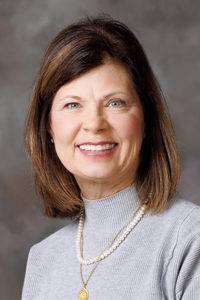Feedlot exemption bill scaled back, advanced
A measure originally intended to create uniformity in the feedlot industry under Nebraska law was narrowed significantly before being advanced to the second round of debate April 2.

Under current law, feedlots within a brand inspection area in Nebraska can become registered feedlots and be exempt from brand inspections when shipping cattle to slaughter. Inspection of RFLs is required, however, when cattle enter the feedlot and the Nebraska Brand Committee can conduct regular audits of RFL records at their discretion.
Sumner Sen. Teresa Ibach, sponsor of LB646, said only the western two-thirds of Nebraska is within the brand inspection area, while the eastern one-third of the state has no branding inspection requirements.
Among other provisions, LB646 as introduced would give feedlots within the brand inspection area the option to apply for exempt certification, which would exempt cattle entering or leaving feedlots from brand inspection requirements in most circumstances.
Ibach said the current system is unfair to rural feedlots that are “huge” economic drivers in rural communities. She said feedlots in the brand inspection area pay annual capacity fees that are projected to total nearly $1 million in 2025 to address a problem she suggested does not exist.
Ibach said feedlot owners have reported “zero” stolen cattle found at registered feedlots despite the size of Nebraska’s cattle industry, which she said is first in the nation for beef exports.
“I’m very proud to work in an industry that the world depends on, and our reputation in Nebraska is unmatched,” she said.
Ibach offered an amendment, adopted 31-2, that she said was the result of negotiations with interested parties and that would replace a pending Agriculture Committee amendment.
The Ibach amendment would require a $1,000 fee to operate a registered feedlot in Nebraska and increase the cap on the physical and electronic inspection fee the Brand Committee may charge from $1.10 per head to $1.50. The amendment also would allow for new inspection exemptions for cattle:
• transferred to the care of another individual without transfer of ownership if proof of temporary possession is established;
• being transferred to or from a qualified dairy;
• transferred to an affiliated grow yard from an inspected RFL under certain conditions; and
• transferred from an affiliated grow yard to an RFL under certain conditions.
Ibach said the amendment would level the playing field for Nebraska dairies and would maintain the integrity of the state’s cattle inspection framework.
“I think this is good legislation,” Ibach said. “This will be a good thing going forward.”
Whitman Sen. Tanya Storer opposed the bill and the amendment. She expressed concerns about senators making changes to how the Brand Committee functions without a full understanding of the industry and the issues.
“This is a major technical change to Nebraska’s brand act that addresses oversight and law enforcement for our number one cash commodity,” Storer said.
She also raised concerns regarding the Brand Committee’s ability to carry out its duties under the amendment’s new fee structure. For example, she said, a feedlot with a 50,000 head capacity currently pays $1 per head, or $50,000 per year. Under the amendment, that would change to an annual fee of $1,000.
“This is a drastic change in the funding structure of this committee,” Storer said.
She offered an amendment to instead require the Nebraska Brand Committee to develop a report recommending updates to fees and inspections in all aspects of the livestock industry. The report would be delivered to the Legislature no later than Dec. 31.
That amendment failed on a vote of 9-14.
North Platte Sen. Mike Jacobson agreed that the “wholesale changes” in Ibach’s amendment would be a “big shock to the system” for the Brand Committee.
While noting that debates over the future direction of the Brand Committee have stymied lawmakers in the past, Blair Sen. Ben Hansen said the cattle industry is too important to Nebraska’s economy to fail to find a solution that all parties can live with.
“I’ve listened to the same argument every year for seven years,” Hansen said. “It is time we act.”
Ibach said she was open to further changes to the fee structure, as well as amendments needed to address technical concerns with the measure. She also indicated that if she and Storer cannot reach agreement moving forward, she would not ask that the bill be scheduled for second-round debate.
Following the 26-3 adoption of the committee amendment, lawmakers advanced LB646 to select file on a vote of 26-2. Twenty-five votes were needed.


